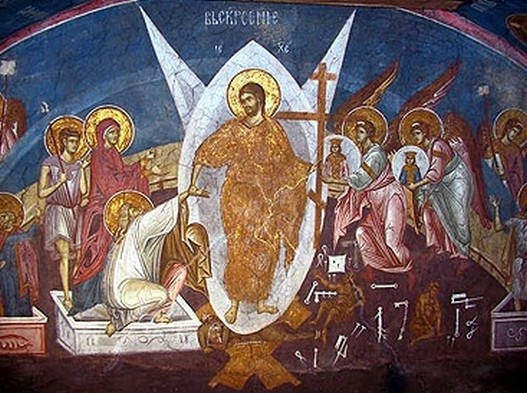
Bright week begins with the Sunday of Pascha, and comes to a close on Bright Saturday, at Vespers. One may actually argue that Bright week comes to a close before the ninth hour (which precedes vespers), since the royal doors and deacons doors, which have been wide open all week, are closed. This is a sad and significant moment. Just like our forefathers Adam and Eve, we cannot remain in paradise in this life, because of our sins. Ours is a life of struggle against our passions, which hold us back from full realization of paradise in this life.
Even though Easter Sunday is the day of celebration of the resurrection of Christ, soon Christian communities discovered that one day to celebrate such a great event wasn’t enough and extended the celebration of the resurrection to one week. The same celebratory tone is given to the liturgy and religious practices, and the events are considered to be part of one continuous day.
For Orthodox Christians, Easter Sunday starts what is known as Bright Week, or Renewal Week, symbolizing the new light that came forth in their lives from the resurrection of Jesus and the renewed opportunity to a fruitful life with Christ. The second day of Bright Week is Easter Monday. It is a national holiday in many Orthodox Christian countries and serves not only to continue the celebrations of Easter Sunday but also to slowly re-enter the rhythm of work and studies.
This tradition resembles that of Fat Tuesday before Ash Wednesday on which, before the period of fasting during Lent season, are celebrations and preparations for the following day’s more serious tone. So Easter Monday is a day to rejoice and come out from fasting and eat the blessed foods from the previous liturgical celebration on Sunday.
Easter Monday continues with the celebrations of Easter Sunday and is considered to be as if it is the same day with some minor changes in the liturgical celebrations. In Orthodox Christian churches the altar is separated by a screen from the nave, where the faithful attend the liturgical services.
This screen is called the iconostasis. The doors on the iconostasis are closed and only the high clergy can pass through them. During Easter Monday, and all throughout Bright Week, these doors are open.
Easter Monday is a day to rejoice and enjoy the fact that the rules of fasting have been lifted and within the same spirit of recollection and prayer everything can be eaten again. It is common to eat the Pascha, which is a dish made of cheese and eggs, with other ingredients, that are forbidden to be eaten during the days of the Great Fasting. Easter eggs colored red to symbolize the blood of Christ are also eaten on Easter Monday.
In Greece it is an important tradition to gather the whole family on this day and roast a lamb. In Russia during Bright Week all taverns used to be closed and no alcohol was allowed to be sold, but the lighter mood of Bright Week has since taken hold.
 Bright week begins with the Sunday of Pascha, and comes to a close on Bright Saturday, at Vespers. One may actually argue that Bright week comes to a close before the ninth hour (which precedes vespers), since the royal doors and deacons doors, which have been wide open all week, are closed. This is a sad and significant moment. Just like our forefathers Adam and Eve, we cannot remain in paradise in this life, because of our sins. Ours is a life of struggle against our passions, which hold us back from full realization of paradise in this life.
Bright week begins with the Sunday of Pascha, and comes to a close on Bright Saturday, at Vespers. One may actually argue that Bright week comes to a close before the ninth hour (which precedes vespers), since the royal doors and deacons doors, which have been wide open all week, are closed. This is a sad and significant moment. Just like our forefathers Adam and Eve, we cannot remain in paradise in this life, because of our sins. Ours is a life of struggle against our passions, which hold us back from full realization of paradise in this life.